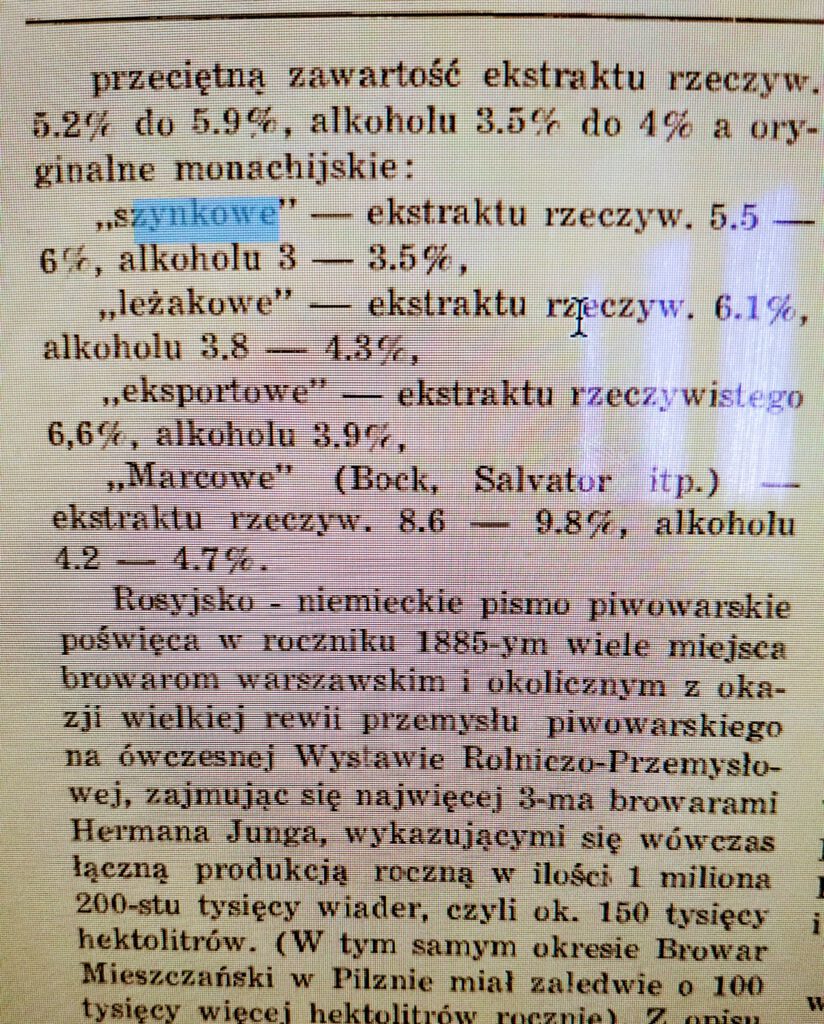There is talk on Twitter today for the meaning in Polish of “piwo szynkowe”, of which variant spellings existed (also in Czech, etc.).
I discussed the term in my post of April 30 this year on the Stefan Weiss brewery in Kolomyja, Galicia.
I feel I hit on the answer, meaning it is the Polish version of schenk bier. See in particular the discussion in Comments.
Schenk is the German-derived, bottom-fermented beer brewed in colder season that wasn’t long aged, or so-called sommer bier.
It was known in variant spellings through the international brewing world.
The term is not standard Czech or Polish in connection with beer, I understand, so likely had a trade or specialized meaning.
The term, by my recent surveys of prewar Polish brewing, was in no regular use, and seems a late-1800s occasional expression.
However, a 1938 issue of the Polish brewing journal I’ve discussed recently, Przegląd Piwowarsko-Słodowniczy (Brewing & Malting Review) mentions the term. See pg. 10 (via Wielkopolska Digital Library).
It is in an article on how pilsener beer emerged to acceptance in Poland, by Marian Kiwerski, a brewing engineer and beer historian.
Of course it is in Polish, but as I read it, a portion refers to late-1800s analyses of Bavarian beers by a Russian scientist, L.N. Simonova. This table follows:
Stefan Weiss started brewing about the same period.
The alcohol range for szynkowe is the lowest, which sounds right for a “pub” beer served in quantity, and schenk bier traditionally was lower in alcohol than fully-aged lager, which gained in strength over time.
I think too lezakowe here means lager properly speaking, fully-aged, therefore with higher average alcohol than the other.
I think this supports the schenk bier interpretation, given also the German context a Polish article is alluding to.
Last point. In my post earlier this month I discussed a chart of data for Czech and other beers that appeared in a ca. 1900 Polish encyclopedia (the hyperlinked page number in post leads to the chart). The term zwyczajne appeared numerous times in the Czech section as a beer type, and once with other terms in the Polish summary.
In Polish it translates to “normal”, and most of these beers seemed relatively low alcohol, run of the mill so to say.
Offhand, and I do not speak Polish certainly, this word seems different than szynkowe, which seems in the standard tongue unconnected to beer in any way. Whereas “normal” could conceivably denote a beer of average quality, as say ordinary vs. special bitter in the U.K.
I don’t know, too, how in its beer sense szynkowe is pronounced. The ham sense does not sound at all like schenk (nor does zwyczajne for normal). If in its beer sense szynkowe is pronounced to sound like schenk, well that would support a connection.
So far the schenk idea seems the most plausible to me for the beer sense of szynkowe, but happy to hear other ideas.
Note re image: image drawn from source identified and linked in the text. All intellectual property therein belongs solely to lawful owner, as applicable. Used for educational and research purposes. All feedback welcomed.


I do think that the letter y in Polish is pronounced more like an e in German (actually when it is followed by an h like in Reh) or an é in French, but my experience of Polish phonetics harks back to a couple weeks of holiday in Poland in 2008, it would be great if a speaker of the language could confirm. 🙂
Cheers,
Yann
Thanks Yann. Definitely an area where my knowledge is even less, so must await any further comments.
You could try to hear how Google translate pronounces it?
I did Yann, earlier. Both terms sound quite different from schenk. One version of schenk in German, I think with an e at the end, had the meaning “donate” ascribed. (That word and variants all seem to riff on give, serve, pour, etc._).
That one was two syllables, schenk-eh. I am wondering if zynkowe was possibly pronounced like that i.e. in transliterated form.
I am not sure anyone knows as it is so long ago it was used in that sense. There is the odd beer still called that in Poland, and apparently Moravia, but even if not sounding like that two-syllable German word, maybe in 1900 it did?
Can’t take it any further. But still at bottom I have an intuitive feeling there is a connection.
From an English source, 1870: Schenk from a German verb to pour, meaning put on draft as soon as made: https://www.google.ca/books/edition/Putnam_s_Magazine_of_Literature_Science/Yk8AAAAAYAAJ?hl=en&gbpv=1&dq=shenk+bier&pg=PA523&printsec=frontcover